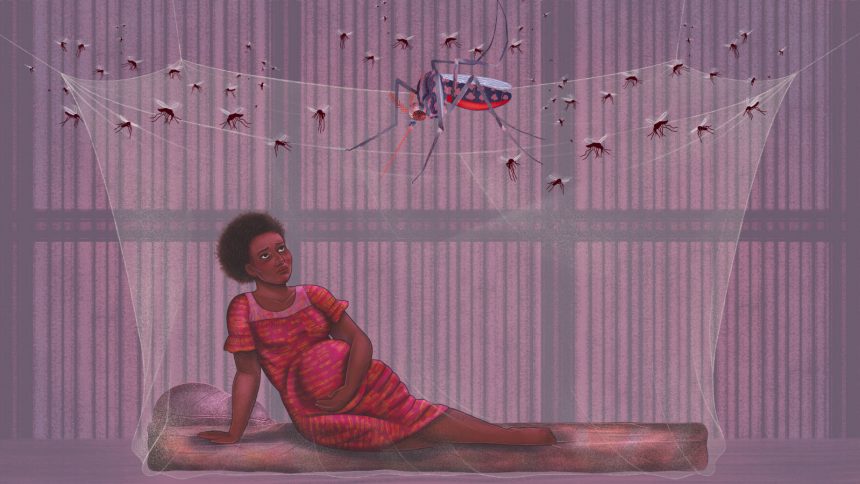This story is part of the series Expecting worse: Giving birth on a planet in crisis, a collaboration between Grist, Vox, and The 19th that investigates how climate change impacts reproductive health — from menstruation to conception to birth.
Roger Casupang was working in a coastal clinic on the north side of Papua New Guinea, an island nation of 9 million in the southwestern Pacific Ocean, when a pregnant woman burst into his facility. She was in labor, moments away from delivering twins. She also had a severe case of malaria, a life-threatening mosquito-borne illness common in tropical countries. Casupang, an obstetrician, quickly took stock of the situation. When the parent is healthy, a twin pregnancy is twice as risky as a single pregnancy. Meanwhile, severe malaria kills nearly half of the people who develop it during pregnancy. The woman was exhausted and delirious. Because many of his patients walked for days to get medical care for standard ailments, Casupang didn’t know which province she had come from or how long she had been traveling before she reached his clinic. What he did know was that the woman had arrived just in time. “She was actually pushing when she came in,” he said.
Casupang, who was born in one of Papua New Guinea’s highland provinces and had been practicing medicine on the island for the better part of a decade at the time, had seen pregnant women die in less dire circumstances. Against all odds, with limited medical resources and medicines at their disposal, Casupang and the other medical professionals at the clinic were able to deliver the twins safely. Both babies weighed less than three pounds each, a consequence of their mother’s raging infection. The twins were moved to the nursery while Casupang and his fellow physicians worked to stabilize the mother. She was reunited with her babies after 10 days of intensive care. “If this case had presented in a remote facility,” Casupang said, “the narrative would have been very different.”
Casupang’s patient was lucky to survive — but she also benefited from geography. On the coast, doctors see lots of patients with malaria, and many of those patients carry antibodies that protect them from severe infection. But malaria is on the move.
Temperatures are rising around the world but particularly in countries where the disease is already present. That warming coaxes mosquitoes toward higher elevations, even as temperatures have historically been too cold for the insects to thrive. In these high-altitude areas, mosquitoes are feeding on people who have never had malaria before — and who are much more susceptible to deadly infections. “When malaria hits new populations that are naive, you tend to get these explosive epidemics that are severe because people don’t have any existing immunity,” said Sadie Ryan, an associate professor of medical geography at the University of Florida.
Pregnant people living in highland regions who have never had malaria before are worst-positioned to survive the bite of an infected mosquito. The very act of becoming pregnant creates a potentially deadly vulnerability to malaria. The placenta, the new organ that forms to nourish the fetus, presents new receptors for the disease to bind to.
Pregnant women are three times more likely to develop severe malaria compared to nonpregnant women. For people who can become pregnant, the climate-driven upward movement of malaria mosquitoes poses nothing less than an existential threat. “In Western countries, especially where malaria is not endemic, there is this perception that malaria has been around for so long that we already know how to deal with it,” said Deekshita Ramanarayanan, who works on maternal health at the nonpartisan research organization the Wilson Center.
But that was never the case, and the perception is especially flawed now, as climate change threatens to rewrite the malaria-control playbook. “Pregnant people are hit with this double risk factor of climate change and the risks of contracting malaria during pregnancy,” Ramanarayanan said.
Malaria is carried by dozens of species of Anopheles mosquitoes, also known as marsh or nail mosquitoes. Anopheles mosquitoes carry a parasite called Plasmodium — the single-cell genus that causes malaria in birds, reptiles, and mammals like humans.
When the bite of an Anopheles mosquito introduces Plasmodium into the human bloodstream, the parasites travel to the liver, where they lurk undetectably and mature for a period ranging from weeks to a year. Once the parasites reach maturity, they venture out into the bloodstream and infect red blood cells. The host often experiences symptoms at this stage of the infection — fever, chills, nausea, and general, flu-like discomfort.
The earlier a malaria infection is caught, the better the chances that antimalarial medications can help prevent the development of severe malaria, when the disease spreads to critical organs in the body.
Pregnancy primes the body for infection. The immune system, when it is functioning properly, engages an arsenal of weapons to ward off bacteria, viruses, and other pathogens. But pregnancy acts like an immunosuppressant, telling the defense system to stand down in order to ensure the body does not inadvertently reject the growing baby. “Your immune system is, on purpose, dialed back so that you can tolerate the fact that you have this fetus inside of you,” said Marya Zlatnik, an obstetrician and gynecologist at University of California, San Francisco Medical Center. Then there’s the added strain of supplying the baby with enough nutrients, vitamins, and minerals. The body must work overtime to provide for the metabolic needs of two.
This factor, exacerbated by poverty, malnutrition, and subpar medical infrastructure in countries where malaria is commonly found, poses enormous challenges to maternal and fetal health. A malaria infection on top of those existing vulnerabilities introduces another, even more challenging set of obstacles.
The disease can produce severe maternal anemia, iron deficiency, or it can spread to the kidneys and the lungs and cause a condition known as blackwater fever. The disorder makes patients jaundiced, feverish, and dangerously low on vitamins crucial for a healthy pregnancy. “It’s pretty much synonymous with death for many patients up in the rural areas,” Casupang said.
Research shows that malaria may be a factor in a quarter of all maternal deaths in the countries where the disease is endemic.
Plasmodium parasites have spikes on them, similar to the now-infamous coronavirus spike proteins, that make them sticky and prone to clogging up organs. If Plasmodium travel to the placenta, the parasites bind to placental receptors and cause portions of the placenta to die off.
“It changes the architecture of the placenta and the ways nutrients and oxygen are exchanged with the fetus,” said Courtney Murdock, an associate professor at Cornell University’s department of entomology. The placental clots interfere with fetal growth, and they’re one of the reasons why a pregnant woman is between three and four times more likely to miscarry if she has a malaria infection, and why babies born to mothers sick with malaria come out of the womb malnourished and underweight.
Fetal mortality is closely tied to how much of the placenta becomes oxygen deprived. “The babies come out with very low birth weights,” he said. If the placental clots are extensive, “they usually die.”
In 2020, approximately 122 million pregnancies — about half of all pregnancies worldwide that year — occurred in areas where people were at risk of contracting malaria.






